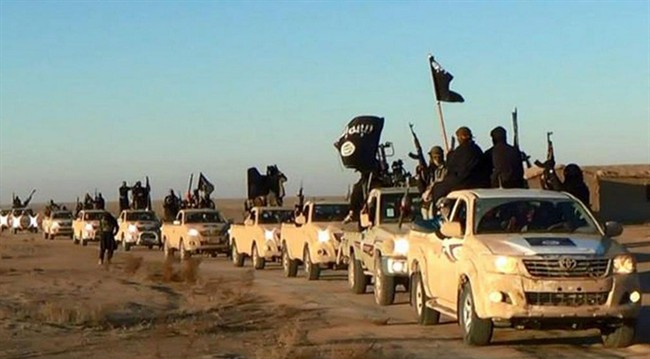BEIRUT – The Islamic State group has dramatically expanded its theatre of operations from its hub in Syria and Iraq, executing or inspiring a series of attacks across three continents that claimed more than 800 lives this year.

The mayhem created by those attacks – including the downing of a Russian airliner and a killing spree in the heart of Paris – attracts the kind of attention that the extremist group thrives on.
IS, which has recently lost territory to U.S.-backed forces in Syria and Iraq, seeks to boost its credentials with spectacular acts of violence that attract recruits.
The scope of recent attacks and number of those killed and wounded demonstrate a level of sophistication and a determination that has shocked even closer observers of IS. The attacks reveal the extents to which the group is willing to go to surpass al-Qaida and prove itself the most dominant jihadi movement on the planet.
READ MORE: Here’s why world leaders are calling ISIS ‘Daesh’
The attacks also demonstrate the IS group’s ability to deliver multiple blows to an array of forces aligned against it. Last month’s downing of the Russian plane, for instance, targeted both Russia and Egypt, whose governments have been fighting the group.
On Wednesday, the Islamic State group announced it has killed Norwegian and Chinese captives, reflecting its intention to continue kidnapping and killing hostages inside its “caliphate” in Sunni areas of Syria and Iraq, while at the same time pursuing mass murder abroad.
Thousands of people have been killed by IS in Syria in and Iraq this year in mass executions, bombings and other attacks.
VIDEO: Online producer Yuliya Talmazan explains why a guidebook to the Islamic State that’s circulating online is raising many eyebrows.
Here’s a timeline of IS attacks outside Syria and Iraq this year:
Nov. 13: At least 129 people are killed in Paris with over 350 wounded, most at a concert hall, but some at trendy restaurants and several near a national stadium. IS claims the attack, the worst in the history of Paris, calling it retaliation for France’s role in U.S.-led airstrikes against IS in both Iraq and Syria.
—
Nov. 12: Twin powerful suicide bombings tear through a crowded Shiite neighbourhood of Beirut, killing 43 people and wounding more than 200 others. IS claims the attack.
—
Oct. 31: A bomb downs a Russian airliner 23 minutes after it takes off from the Red Sea resort of Sharm el-Sheikh bound for the Russian city of St. Petersburg. The plane crashes in Egypt’s Sinai Peninsula, home to a potent IS affiliate, killing all 224 people on board, most of them Russian tourists. IS claimed the attack.
—
Oct. 10: Two suicide bombings kill at least 100 people at a peace rally in Ankara, Turkey. The attack was not claimed by IS but the Turkish prosecutor investigating the attack said it was carried out by a local IS cell.
—
Oct. 6: Suicide car bombings targeting exiled Yemeni officials and the Saudi and Emirati troops backing their efforts to retake the country kill at least 15 people in the port city of Aden. A new IS affiliate claimed responsibility for the assault, which officials earlier blamed on Yemen’s Shiite rebels.
—
Aug. 6: A suicide bomber attacks a mosque inside a police compound in western Saudi Arabia, killing 15 people in the deadliest attack on the kingdom’s security forces in years. Eleven of the dead belonged to an elite counterterrorism unit whose tasks include protecting the hajj pilgrimage. IS claimed the attack.
—
June 26: Gunman kills 38 tourists, mostly Britons, in the coastal resort of Sousse, Tunisia, while a bomb rips through one of Kuwait’s oldest Shiite mosques during Friday prayers, killing 27 people. It was the first major militant attack in Kuwait in more than two decades and was claimed by IS. In a third attack that same day, a truck driver once known for radical Islamic ties crashes into a U.S.-owned chemical warehouse in southern France and hangs his employer’s severed head on a factory gate, along with banners with Arabic inscriptions.
—
May 29: A suicide bomber disguised as a woman blows himself up in the parking lot of the only Shiite mosque in the Saudi port city of Dammam, killing four people. IS claimed the attack.
—
May 22: A suicide bomber strikes a Shiite mosque in eastern Saudi Arabia as worshippers commemorate the birth of a revered saint, killing 21 people and wounding dozens more. The attack happened in the eastern Qatif region, the heartland of Saudi Arabia’s Shiite Muslim minority. It was the deadliest militant assault in the kingdom in more than a decade and was claimed by IS.
—
April 18: Afghan President Ashraf Ghani blames the Islamic State group for a suicide bombing in the country that kills at least 35 people and wounds 125.
—
March 20: An emerging IS affiliate in Yemen claims a series of suicide bombings that kill 137 people and wound 345.
—
March 18: Extremist gunmen open fire on foreign tourists at Tunisia’s National Bardo Museum, killing 22 people in the country’s worst attack on civilians in 13 years. The Islamic State group later claimed responsibility for the Bardo attack.



Comments